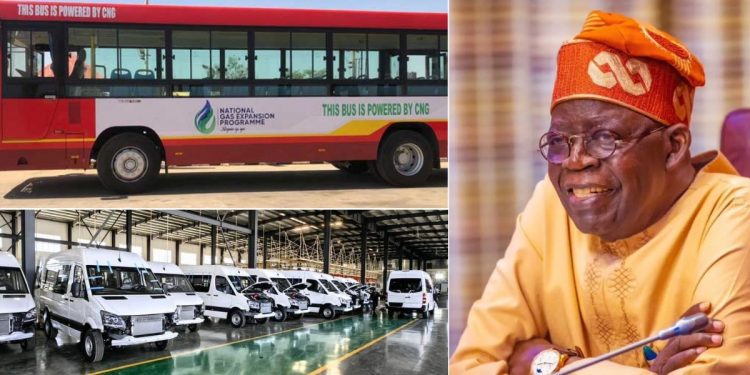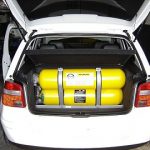The Federal Government is set to introduce Compressed Natural Gas (CNG) vehicles for mass transit, beginning this May, as part of President Bola Tinubu’s one-year anniversary initiatives. This move aims to enhance affordability, safety, and environmental sustainability in the transportation sector.
Special Adviser to the President on Information and Strategy, Bayo Onanuga, revealed the government’s plans, highlighting the target of deploying about one million CNG vehicles by 2027. The initiative, led by a committee chaired by Michael Oluwagbemi, focuses on delivering cheaper, safer, and more climate-friendly energy vehicles, including buses, tricycles, and automobiles.
The Federal Government has allocated N100 billion from the N500 billion palliative budget to purchase 5,500 CNG vehicles, as part of efforts to cushion the impact of rising petrol prices on the masses. This includes buses, tricycles, electric buses, and over 20,000 CNG conversion kits, alongside the development of CNG refilling stations and electric charging stations.
Private sector partners in the Presidential CNG Initiative (PCNGI) have responded with over $50 million in investments in refueling stations and conversion centers, supported by tax and duty waivers approved by President Tinubu. These initiatives aim to ensure the safe and reliable conversion of vehicles to CNG propulsion, adhering to strict safety standards.
The deployment of CNG vehicles will mark a significant energy transition in Nigeria’s transportation industry, reducing reliance on more expensive diesel and petrol. With natural gas abundant in at least 30 states, the initiative aims to mitigate air pollution and align with Nigeria’s commitments under the Paris Climate Accord.
Key players in the initiative, including JET, Mikano, Mojo, and Brilliant EV, are involved in assembling CNG buses and electric vehicles, with plans to produce thousands of units in the first phase. NIPCO, BOVAS, and MRS are setting up refueling stations and conversion centers nationwide to support the growing fleet of CNG vehicles.
NNPC Limited is also joining the initiative, announcing plans to establish CNG refilling and conversion centers across the country. Collaborating with 22 agency partners, the initiative aims to develop 80 Natural Gas Vehicle Conversion and Associated Appliances Standards to ensure industry compliance and safety.
President Tinubu’s administration is facilitating the evolution of the CNG industry through public-private collaboration, with the aim of delivering significant milestones in vehicle conversion and refuelling infrastructure by the end of the year.
The launch of CNG vehicles for mass transit underscores the Federal Government’s commitment to sustainable and affordable transportation solutions. With support from private sector partners, regulatory bodies, and industry stakeholders, Nigeria is poised to achieve a significant energy transition in its transportation sector, contributing to economic development and environmental preservation.










